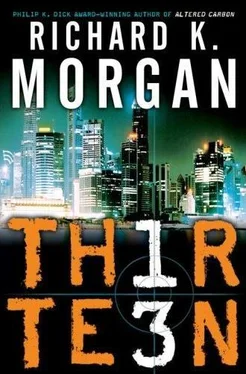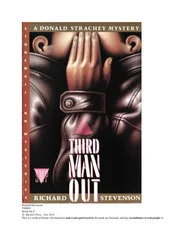But the panic, the sense of inescapable nemesis, won’t let her go. She feels it dull and insistent, like a dog worrying at an anesthetized limb.
She rolls her head sideways on the gurney, and sees him.
More familiarity, sharper now, jolting through her like current.
Once, on a trip to Europe, she went to the Museo della Sindone in Turin and saw the tortured image printed on cloth that they keep there. She stood in dimness on the other side of the bulletproof glass, surrounded by the reverent murmurs of the faithful. Never a believer of any sort herself, Larsen was still oddly moved by the harsh and hollow lines of the face staring back at her out of the sealed vacuum chamber. It seemed a testament to human suffering that completely short-circuited its divine pretensions, that rendered the devotions paid it beside the point. You looked at that face and you were struck by the sheer stubborn survivability of organic life, the heritage of built-in, bitten-down defiance that the long march of evolution had gifted you with.
It could be the same man. Here, now.
He’s propped against a tall corner cabinet, staring at her, rope-sinewed arms folded across a cage-gaunt chest whose ribs she can see even through the T-shirt he wears, long straight hair hanging either side of narrow features drawn even thinner with pain and want. His mouth is a clamped line, etched in between the sharp chin and blade-boned nose. Hollows cling under the bones in his cheeks.
Her heart surges sluggishly in her chest as she meets his eyes.
“Is it—” With the words, an awful understanding is welling up inside her now, a monstrous recognition that her conscious mind is still sprinting hard ahead to evade. “Is it my knee? My leg?”
Out of somewhere, abruptly, she finds strength, she props herself up on her elbows, she forces herself to look.
Sight collides with recollection.
The scream shrills up out of her, rips momentarily through the cobwebby drapery of the drugs in her system. She can’t know how weak it sounds in the cold dimensions of the surgery, inside her it seems to splinter in her ears, and the knowledge that comes with it is a blackening of vision that threatens to suck her away. She is not, she knows, screaming at what she can see;
Not at the neatly bandaged stump where her right thigh ends twenty centimeters below her hip; not that.
Not at the stabbed-home comprehension that the ache in her knee is a phantom pain in a limb she no longer owns; not that.
She’s screaming at memory.
The memory of the gurney ride along the quiet corridor, the soft bump and turn into the surgery, and then, veiled in the drug haze, the rising whine of the saw blade, the grating slip in tone as it bites, and the small, suckling sizzle of the cauterizing laser that comes after. The memory of the last time, and the sickening, down-plunging understanding that it’s all about to happen again.
“No,” she husks. “Please.”
A long-fingered hand presses warmly down on her forehead. The Turin shroud countenance looms above her.
“Shshshsh…the cormorant knows why…”
Past the face, she sees movement. Knows it from memory for what it is. The stealthy, unflexing spider-leg motions of the autosurgeon as it wakes.
Gleaming steel…
Above all, the hard lessons of this century have taught us that there must be consistent oversight and effective constraint, and that the policing systems thus required must operate with unimpeachable levels of integrity and support.
—Jacobsen Report, August 2091
He finally found Gray in a MarsPrep camp just over the Bolivian border and into Peru, hiding behind some cheap facial surgery and the name Rodriguez. It wasn’t a bad cover in itself, and it probably would have stood standard scrutiny. Security checks in the prep camps were notoriously lax; the truth was that they didn’t much care who you’d been before you signed up. But there were still a few obvious signs you could look for if you knew how, and Carl, with a methodical intensity that was starting to resemble desperation, had been looking for weeks. He knew that Gray was up on the altiplano somewhere, because the trail led there from Bogotá, and because where else, ultimately, was a variant thirteen going to run. He knew this, and he knew it was just a matter of time before the traces showed up and someone called it in. But he also knew, with induction programs everywhere skimping and speeding up to meet increasing demand, that time was on the other man’s side. Something had to give, and soon, or Gray was going to be gone and Carl wasn’t going to get his bounty.
So when the break came, the tiny morsel of data finally fed back from the web of contacts he’d been plying all those weeks, it was hard not to jump. Hard not to dump his painstakingly constructed cover, fire up his Agency credit and badge, and hire the fastest set of all-terrain wheels available in Copacabana. Hard not to tear across the border at Agency speed, raising road dust and rumors all the way to the camp, where Gray, of course, if he had any kind of local support, would be long gone.
Carl didn’t jump.
Instead, he called in a couple of local favors and managed to blag a ride across the border with a military liaison unit—some superannuated patrol carrier with a Colony corporation’s logo sun-bleached to fading on the armored sides. The troops were Peruvian regulars, drafted in from dirt-poor families in the coastal provinces and then seconded to corporate security duties. They’d be pulling down little more than standard conscript pay for that, but the interior of the carrier was relatively plush by military standards and it seemed to have air-con. And anyway, they were tough and young, a sort of young you didn’t see so much in the Western world anymore, innocently pleased with their hard-drilled physical competence and cheap khaki prestige. They all had wide grins for him, and bad teeth, and none was older than twenty. Carl figured the good cheer for ignorance. It was a safe bet these kids didn’t know the subcontract rate their high command was extracting from its corporate clients for their services.
Sealed inside the jolting, sweat-smelling belly of the vehicle, brooding on his chances against Gray, Carl would really have preferred to stay silent altogether. He didn’t like to talk, never had. Felt in fact that it was a much-overrated pastime. But there was a limit to how taciturn you could be when you were getting a free ride. So he mustered some lightweight chat about next week’s Argentina—Brazil play-off and threw as little of it into the conversational mix as he thought he could get away with. Some comments about Patricia Mocatta, and the advisability of female captains for teams that were still predominantly male. Player name checks. Tactical comparisons. It all seemed to go down fine.
“¿Eres Marciano?” one of them asked him, finally, inevitably.
He shook his head. In fact, he had been a Martian once, but it was a long, complicated story he didn’t feel like telling.
“Soy contable,” he told them, because that was sometimes what he felt like. “Contable de biotecnologia.”
They all grinned. He wasn’t sure if it was because they didn’t think he looked like a biotech accountant, or because they just didn’t believe him. Either way they didn’t push the point. They were used to men with stories that didn’t match their faces.
“Habla bien el español,” someone complimented him.
His Spanish was good, though for the last two weeks it was Quechua he’d been speaking mostly, Mars-accented but still tight up against the Peruvian original that had spawned it. It was what the bulk of the altiplano dwellers used, and they in turn made up most of the grunt labor force in the prep camps, just as they still did on Mars. Notwithstanding which fact, the language of enforcement up here was still Spanish. Aside from a smattering of web-gleaned Amanglic, these guys from the coast spoke nothing else. Not an ideal state of affairs from the corporate point of view, but the Lima government had been adamant when the COLIN contracts were signed. Handing over control to the gringo corporations was one thing, had oligarchy-endorsed historical precedent on its side in fact. But allowing the altiplano dwellers to shake themselves culturally loose from the grip of coastal rule, well, that would be simply unacceptable. There was just too much bad history in the balance. The original Incas six hundred years ago and their stubborn thirty-year refusal to behave as a conquered people should, the bloody reprise by Túpac Amaru in 1780, the Sendero Luminoso Maoists a bare century back, and more recently still the upheavals of the familias andinas . The lessons had been learned, the word went out. Never again. Spanish-speaking uniforms and bureaucrats drove home the point.
Читать дальше












